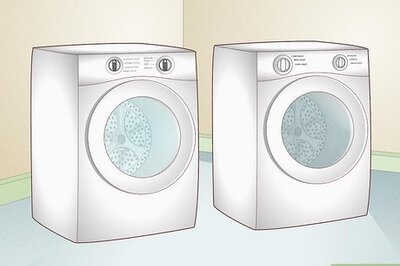
views
Common Causes of False Alarms
Dying battery If your smoke alarm is making short, frequent, high-pitched beeps, it’s likely because the batteries need to be replaced. This typically happens every 10 years. Sound: Very short beep or “chirping” sound. Troubleshoot: Hush the alarm (if you can) by pushing the button on the detector. Replace the battery as instructed on the alarm, or replace the alarm itself. Firefighter David Decker says, "Whenever there’s a time change for daylight savings time, you want to change your [smoke alarm’s] battery.”
Cooking Searing your steak or getting a nice char on your veggies may cause a smoke alarm to suddenly go off. While you may not have made a lot of smoke, experimenting in the kitchen can create enough to trigger the alarm (even if there’s not a real fire). Sound: 3 beeps and a pause. Troubleshoot: Remove food and pans from the heat. Open windows and doors and turn on fans (specifically an exhaust fan) to ventilate the area.
Steam If your smoke alarm is near a bathroom or kitchen, it’s quite common for the alarm to be triggered by hot steam from the shower or stovetop. So, if the alarm starts going off after you’ve taken a hot shower or boiled some pasta and there’s no smoke in sight, steam is likely the cause. Sound: 3 beeps and a pause. Troubleshoot: Move the alarm at least 36 in (91 cm) away from bathroom doors and cooking appliances.
Dust Sometimes, a smoke alarm can beep or alarm when the detector itself is dirty. Dust, dirt, cobwebs, and even insects can block the sensor and make the alarm falsely sound. Sound: 3 beeps and a pause. Troubleshoot: Use compressed air or a vacuum to clean around the detector.
Temperature changes Smoke alarms work best in 40 to 120 °F (4 to 49 °C). If the temperature rises or drops above or below these levels, it may cause a false alarm. Sound: 3 beeps and a pause. Troubleshoot: Check the manufacturer’s instructions for your alarm’s ideal temperature range (this may be listed on the alarm). Then, determine if the room is above or below that temperature.
Aerosol sprays Spraying too much hairspray, perfume, or air freshener could cause a false alarm. If you just sprayed something under or near a smoke alarm, this is likely the cause of its sudden and random beeping Sound: 3 beeps and a pause. Troubleshoot: Spray less product and move away from the detector when spraying in the future.
High humidity levels Older smoke alarms can be set off in humid conditions. Unlike today’s models, older alarms are not designed to withstand high humidity. Sound: 3 beeps and a pause. Troubleshoot: Replace old, out-of-date alarms and work on controlling the humidity in your home.
Electrical issues If your smoke alarm has faulty wiring or a low voltage issue, it may give off false alarms. This is most common in hardwired detectors (detectors wired directly to your home’s electrical system and don’t necessarily need a battery) that need replacing. Sound: 3 beeps and a pause. Troubleshoot: Schedule regular maintenance on a hardwired detector to ensure all wiring is up to date.
How to Test Your Smoke Alarm’s Sensitivity
If your smoke alarm keeps going off randomly, it might be a good idea to check its sensitivity to determine whether or not it should be replaced. There are many ways you can test your detector, such as: Holding down the alarms’s test button and waiting for the alarm to sound. Buying smoke alarm test spray and using it on the detector as instructed on the product’s packaging. Using the testing instrument that came with your smoke alarm upon purchasing. The National Fire Protection Association (NFPA) recommends testing alarms every month.
Upgrading Your Smoke Alarms
It’s recommended to upgrade smoke alarms every 10 years and replace the batteries every year. But if your alarm is extremely sensitive and keeps giving false alarms, it might be time to upgrade. Newer models have fancier features that help prevent false alarms and ensure a smoother experience. Here are some things you might want to look for when upgrading your smoke alarms: Dual-sensor technology: These detectors use ionization and photoelectric sensors to detect more types of fires. Wireless interconnection: Detectors with this feature communicate with one another. If one goes off, they all go off. Hush button: This feature allows you to silence an alarm for a short period of time by pressing a button on the detector. Carbon monoxide detection: Detectors with this feature detect smoke and carbon monoxide.
When to Call a Professional
If you’ve tried troubleshooting your alarm, but the alarm still goes off, call a professional. An electric and plumbing expert will be able to work out what’s wrong with your smoke alarm and help you find the best and safest upgrade for you. Similarly, you can also call up the non-emergency line or fire prevention department, as most municipal fire departments or local fire marshals will inspect smoke alarms for free.
How do smoke alarms work?
Smoke alarms detect high levels of heat with light or electrodes. There are 2 types of smoke alarms: photoelectric and ionization. Both types of alarms are designed to detect an increase in heat levels to set off an alarm to protect your from danger, but how they do so is a bit different: Photoelectric smoke alarms use a beam of light to detect heat. There’s an internal chamber inside the alarm with a beam of light in it. When smoke enters the chamber, the light is disrupted, and the alarm will sound. Ionization smoke alarms use electrodes to detect high temperatures. Inside the alarm’s chamber is an electrode or electrical conductor. When smoke enters the chamber, the particles cling to the electrode, disrupting the chemistry and setting off the alarm. Dual-sensor smoke alarms contain photoelectric and ionization sensors for double the safety. Smoke alarms that use strobe lights instead of loud beeps to indicate a fire are also available for those with hearing loss.
Where should you put smoke alarms?
Place smoke alarms outside each bedroom high on the wall or ceiling. The best place to put smoke alarms is outside of sleeping areas, specifically on the other side of doors. This ensures that an alarm will sound in case of a fire, and, as Decker explains, the door acts as a buffer between a sleeping area and flames. Smoke rises, which is why placing alarms high up on a wall or ceiling is important to ensure you get alerted immediately. FEMA advises putting smoke alarms on every level of your home, even if no bedrooms are on a level.




















Comments
0 comment